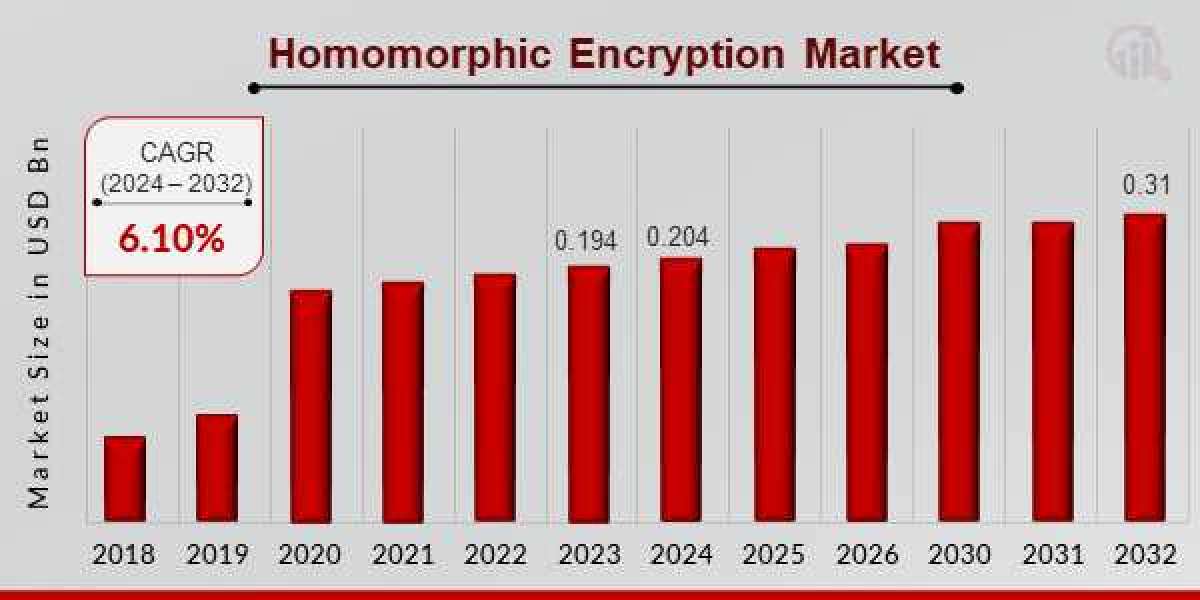Market Overview
Homomorphic encryption is a revolutionary technology in the field of data security, allowing computations to be carried out on encrypted data without needing to decrypt it first. This groundbreaking approach offers significant advantages for privacy-preserving data processing, making it a highly sought-after solution in various industries. The global homomorphic encryption market has been experiencing rapid growth, driven by the increasing need for secure data handling, particularly in sectors such as finance, healthcare, and government. Homomorphic Encryption Market size was valued at USD 194.0 Million in 2023 and is projected to grow from USD 204.0 Million in 2024 to USD 310.0 Million by 2032.
The market is characterized by a surge in research and development activities, aiming to enhance the efficiency and applicability of homomorphic encryption. With the proliferation of cloud computing and big data analytics, the demand for robust encryption methods has never been higher. Homomorphic encryption stands out due to its ability to provide strong security guarantees while enabling data processing capabilities that were previously unfeasible with traditional encryption methods.
Request To Free Sample of This Strategic Report - https://www.marketresearchfuture.com/sample_request/1144
Key Market Segments
By Type
Partially Homomorphic Encryption (PHE)
- Additive PHE: Allows addition operations on encrypted data.
- Multiplicative PHE: Permits multiplication operations on encrypted data.
Somewhat Homomorphic Encryption (SHE)
- Supports a limited number of both addition and multiplication operations on encrypted data.
Fully Homomorphic Encryption (FHE)
- Enables unlimited addition and multiplication operations on encrypted data, representing the most advanced and versatile form of homomorphic encryption.
By Application
Banking and Finance
- Secure financial transactions and data analytics without exposing sensitive information.
Healthcare
- Protecting patient data while allowing complex data analysis for medical research and personalized medicine.
Government
- Ensuring the confidentiality of sensitive government data while facilitating inter-agency data sharing and analysis.
IT and Telecom
- Enhancing data security in communication networks and cloud computing environments.
Others
- Includes sectors such as insurance, retail, and e-commerce.
Industry Latest News
Advancements in FHE
Recent advancements in Fully Homomorphic Encryption (FHE) have been significant, with several tech giants and academic institutions making notable progress. For instance, IBM has been a pioneer in FHE research, consistently pushing the boundaries to make this technology more practical for real-world applications. The company's innovations have focused on reducing the computational overhead associated with FHE, making it more feasible for everyday use.
Strategic Partnerships and Collaborations
The homomorphic encryption market has seen a wave of strategic partnerships and collaborations aimed at accelerating the development and adoption of this technology. Companies are teaming up with academic institutions to leverage cutting-edge research and bring innovative solutions to market. For example, Microsoft has partnered with several universities to advance the field of homomorphic encryption, focusing on creating more efficient algorithms and enhancing security protocols.
Regulatory Developments
Regulatory bodies worldwide are recognizing the potential of homomorphic encryption in enhancing data privacy and security. There have been several initiatives aimed at standardizing encryption protocols to ensure interoperability and security. The European Union, for instance, has been proactive in promoting data protection regulations, which has, in turn, driven the adoption of advanced encryption technologies like homomorphic encryption.
Homomorphic Encryption Companies
IBM Corporation
IBM has been at the forefront of homomorphic encryption research, offering solutions that enable secure data computation. The company's efforts in making FHE more practical and efficient have set industry benchmarks.
Microsoft Corporation
Microsoft is another key player, investing heavily in research and development to enhance the capabilities of homomorphic encryption. The company's initiatives include developing new algorithms and integrating encryption solutions into their cloud services.
Google LLC
Google has also been actively involved in the homomorphic encryption space, focusing on enhancing data security in their vast array of services. The company's contributions include both research and practical implementations aimed at improving user privacy.
Intel Corporation
Intel is making significant strides in hardware-based solutions for homomorphic encryption. By integrating encryption capabilities directly into their processors, Intel aims to provide enhanced security with minimal performance trade-offs.
Enveil
A pioneer in commercial applications of homomorphic encryption, Enveil offers solutions that allow secure data processing in untrusted environments. Their technology is particularly relevant for financial services and government applications.
Market Drivers
Growing Data Privacy Concerns
With the increasing number of data breaches and cyber-attacks, there is a heightened awareness and concern for data privacy. Homomorphic encryption provides a robust solution to protect sensitive information without compromising on data usability, making it an attractive option for organizations worldwide.
Rise of Cloud Computing
The widespread adoption of cloud computing has led to an exponential increase in data generation and storage. Homomorphic encryption allows secure data processing in the cloud, addressing the critical need for privacy-preserving data analytics.
Regulatory Compliance
Stringent data protection regulations, such as the General Data Protection Regulation (GDPR) in Europe and the California Consumer Privacy Act (CCPA) in the United States, are driving the adoption of advanced encryption technologies. Homomorphic encryption helps organizations comply with these regulations by ensuring data remains encrypted during processing.
Technological Advancements
Ongoing advancements in computing power and cryptographic research are making homomorphic encryption more practical and efficient. These technological improvements are reducing the computational overhead traditionally associated with homomorphic encryption, paving the way for broader adoption.
Ask for Customization - https://www.marketresearchfuture.com/ask_for_customize/1144
Regional Insights
North America
North America is leading the homomorphic encryption market, driven by the presence of major technology companies and a strong focus on data privacy. The region's well-established IT infrastructure and high adoption rate of advanced technologies contribute to its market dominance.
Europe
Europe follows closely, with robust regulatory frameworks and significant investments in data security. The European Union's stringent data protection laws are a major driver for the adoption of homomorphic encryption in the region.
Asia-Pacific
The Asia-Pacific region is witnessing rapid growth in the homomorphic encryption market, fueled by increasing digitization and rising awareness of data security. Countries like China, Japan, and India are investing heavily in cybersecurity measures, including advanced encryption technologies.
Latin America
Latin America is gradually embracing homomorphic encryption, with growing investments in IT infrastructure and a rising focus on data privacy. The region's developing economies are recognizing the importance of secure data processing to protect sensitive information.
Middle East Africa
The Middle East and Africa are also seeing a steady increase in the adoption of homomorphic encryption, driven by government initiatives and investments in digital transformation. The focus on enhancing cybersecurity measures is propelling the market forward in this region.
Conclusion
The homomorphic encryption market is poised for significant growth, driven by the increasing need for secure data processing solutions across various industries. Advancements in technology, coupled with stringent regulatory requirements and growing data privacy concerns, are propelling the market forward. With major tech companies leading the charge and regional markets showing promising potential, the future of homomorphic encryption looks bright, promising enhanced security and privacy in the digital age.
Homomorphic Encryption Market Highlights:



